December 4, 2017
Elections and the Need for Political Empowerment
• Organize to Build the New and Refuse to Remain Stuck in the Old
• People Must Play a Role in Deciding the Agenda
• Erie County and Buffalo Elections Results
• Buffalo State Speak Out
Elections and the Need for Political Empowerment
Organize to Build the New and Refuse to Remain Stuck in the Old
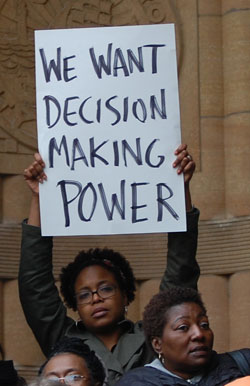 Campaigning for the 2018 elections has already begun, while many are also talking about the 2020 presidential elections. “We must have a big name to defeat Trump,” with Michele Obama, Oprah, Joe Biden and Cuomo among those mentioned. “We must support the Democrats,” “We can not split the vote,” “Voting third party is a wasted vote, we have to chose someone who can win” are other ways the pressure to remain stuck in the old occur. Everyone is to start with the old, with the rotten and rigged electoral system that currently exists. Despite repeated experience that the current set-up, whoever wins, delivers pro-war, anti-people and anti-social results, we are still to accept it as a given. Doing so guarantees that there is not even discussion about the new — even though many readily agree that what exists is rigged against the interests of the people. We are supposedly to think one thing, that the system is rigged, but do another — continue to participate in it anyway, knowing it is rigged. Bringing new people or better ideas to a rigged game only guarantees that we continue to lose.
Campaigning for the 2018 elections has already begun, while many are also talking about the 2020 presidential elections. “We must have a big name to defeat Trump,” with Michele Obama, Oprah, Joe Biden and Cuomo among those mentioned. “We must support the Democrats,” “We can not split the vote,” “Voting third party is a wasted vote, we have to chose someone who can win” are other ways the pressure to remain stuck in the old occur. Everyone is to start with the old, with the rotten and rigged electoral system that currently exists. Despite repeated experience that the current set-up, whoever wins, delivers pro-war, anti-people and anti-social results, we are still to accept it as a given. Doing so guarantees that there is not even discussion about the new — even though many readily agree that what exists is rigged against the interests of the people. We are supposedly to think one thing, that the system is rigged, but do another — continue to participate in it anyway, knowing it is rigged. Bringing new people or better ideas to a rigged game only guarantees that we continue to lose.
Instead it is necessary to start with the necessity for change, the necessity to refuse to accept the old and begin building the new. And central to that new is political empowerment of the people. The content of Who Decides, We Decide! must be addressed. This is true for who decides the platform — We Decide! Who decides the candidates — We Decide! Who decides the character of the process — We Decide! By using the guideline that decision making must be in the hands of the people, steps to build the new can be taken.
For example, discussion among the people — whether on campuses or at workplaces or conferences — on the need for a platform that supports an antiwar government and peace economy is valuable. Popularizing such content, demanding that candidates support it, identifying our own candidates based on such support, is all in our hands to organize. It does not depend on the rich. It does not focus solely on getting elected, which necessarily entrenches us back in the old. It does serve a key aim of raising the quality of political discussion among the people and providing a political atmosphere and public arena for such discussion. Whether a given candidate wins or loses, advancing on such an aim is a significant accomplishment.
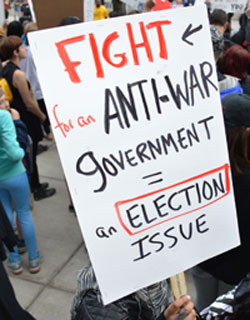 Further, popularizing the need for an antiwar government and peace economy brings these key questions to the fore. The threat of war and the militarization of life impacts all major issues, like the environment, education, inequality. The Pentagon is the single largest polluter and consumer of oil and thus a major cause of environmental destruction. The massive funding of the war machine blocks funding for rights to education, housing, healthcare, jobs. U.S. aggression harms relations with the peoples worldwide, while an antiwar stand contributes to peace and relations of mutual respect and benefit. It is preparation for war that is a main factor behind the testing regime, regimentation and prison-like atmosphere in the public schools, as a youth and workforce trained to obey and submit is required for war. It is preparation for war that poses a direct danger to our youth, who are being recruited to commit crimes against the peoples abroad. It is a war economy that distorts and disrupts the economy, with trillions in wealth produced by workers wasted on war and destruction, rather than being invested in the well-being and rights of the people, abroad and at home. One cannot really talk about issues of education or equality without addressing the need for an antiwar government and peace economy.
Further, popularizing the need for an antiwar government and peace economy brings these key questions to the fore. The threat of war and the militarization of life impacts all major issues, like the environment, education, inequality. The Pentagon is the single largest polluter and consumer of oil and thus a major cause of environmental destruction. The massive funding of the war machine blocks funding for rights to education, housing, healthcare, jobs. U.S. aggression harms relations with the peoples worldwide, while an antiwar stand contributes to peace and relations of mutual respect and benefit. It is preparation for war that is a main factor behind the testing regime, regimentation and prison-like atmosphere in the public schools, as a youth and workforce trained to obey and submit is required for war. It is preparation for war that poses a direct danger to our youth, who are being recruited to commit crimes against the peoples abroad. It is a war economy that distorts and disrupts the economy, with trillions in wealth produced by workers wasted on war and destruction, rather than being invested in the well-being and rights of the people, abroad and at home. One cannot really talk about issues of education or equality without addressing the need for an antiwar government and peace economy.
Building the new can also be done by discussing and organizing for a new electoral process, with public funding for the process, not the candidates, and a process that informs and politicizes the public. Such a process can be developed at a local level and promoted statewide, by candidates chosen by the people and through our independent mechanisms, like Voice of Revolution and similar independent press, websites, etc. Building the new can be done, especially if we do not let the old dictate our actions.
Anyone planning to run should first seek approval by the people and engage with them in deciding the platform. Advancing a platform for an antiwar government and peace economy greatly contributes to the new and we urge all candidates to adopt it.
[TOP]
People Must Play a Role in Deciding the Agenda
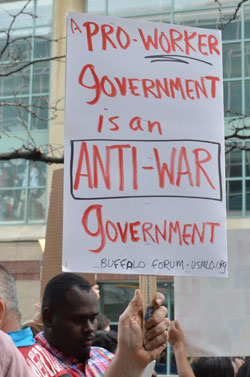 As various individuals begin announcing their plans to run for office in 2018, which include races for New York State Governor and other state and federal offices, one of the problems that presents itself is that of the candidate’s platform. In the current set up, individuals decide to run, often depending not on what kind of pubic support they have, but rather on what kind of financial backing they have or can secure. The individual also commonly decides the platform, and for Governor, their running mate for Lieutenant Governor. The people are then called on to support the given candidate based on what he or she promises. It is a process that excludes the people from deciding the platform, when that should be the starting point.
As various individuals begin announcing their plans to run for office in 2018, which include races for New York State Governor and other state and federal offices, one of the problems that presents itself is that of the candidate’s platform. In the current set up, individuals decide to run, often depending not on what kind of pubic support they have, but rather on what kind of financial backing they have or can secure. The individual also commonly decides the platform, and for Governor, their running mate for Lieutenant Governor. The people are then called on to support the given candidate based on what he or she promises. It is a process that excludes the people from deciding the platform, when that should be the starting point.
It is important to look at the necessity to modernize the process — to put working people at the center, not at the margins, as currently exists. Public meetings and forums of various kinds, at universities, workplaces, community centers, senior’s homes, should be organized to engage the public in discussion about their concerns and the platform they want. If that were to occur, there is no question that problems like poverty, inequality, the environment and war would be key aspects of such a platform. Solutions like guaranteeing the equal rights to education, housing and jobs would also be critical, especially in cities where these rights are systematically denied and racism by the government prevalent.
Instead of candidates coming to promote whatever they have decided on for a platform, what is needed is public debate and discussion. Those considering running should themselves organize such debate — should begin by seeking the views of the public as to what problems to focus on and what solutions can be provided.
Given current conditions, where the threat of broader war and more wars is growing and where militarization is impacting all aspects of life, including the economy, the environment, education and healthcare, the need for an anti-war stand is crucial. More generally, supporting the need for an anti-war government and peace economy is an overall direction needed. What that may concretely mean in each state needs to be explored. In New York State, for example, closing the Hancock drone base near Syracuse and supporting the proposal to close the Niagara Air Force base and turn it into a solar farm, producing far more jobs and clean energy, are more specific demands in an anti-war, peace economy direction. So too would the elimination of military recruiters in our high schools and college campuses. Or at the very least, equal time for an anti-war alternative and support for students opposing the military.
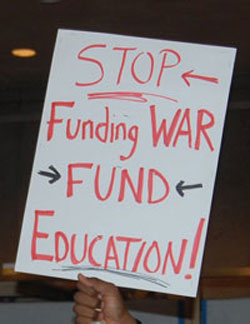 For many cities and states, the issue of lead poisoning is also an important one, both in terms of the right to safe housing and water and in terms of its impact on children and education. Like antiwar issues, it is also a unifying demand, bringing together educators, youth and parents. New York State, for example, refuses to utilize the CDC standard for what constitutes too high a level of lead in the blood. New York uses 10 micrograms per deciliter of blood, while the CDC, in 2012, adopted a threshold of 5 micrograms. Further the CDC states that no level of lead in the blood is safe. How is it that New York can provide $1.31 billion in public funds to the Pentagon but cannot ensure safe housing and drinking water for all?
For many cities and states, the issue of lead poisoning is also an important one, both in terms of the right to safe housing and water and in terms of its impact on children and education. Like antiwar issues, it is also a unifying demand, bringing together educators, youth and parents. New York State, for example, refuses to utilize the CDC standard for what constitutes too high a level of lead in the blood. New York uses 10 micrograms per deciliter of blood, while the CDC, in 2012, adopted a threshold of 5 micrograms. Further the CDC states that no level of lead in the blood is safe. How is it that New York can provide $1.31 billion in public funds to the Pentagon but cannot ensure safe housing and drinking water for all?
An essential part of a platform is also that on electoral reform, so as to modernize the current system in a manner that empowers the people themselves to govern and decide. The current set up does the opposite. It keeps the people out of power and the rich in power. It robs the people of a deciding role and imposes a system that is corrupt and characterized by hugely expensive negative campaigning divorced from the problems of the times and their solutions. It is a system that produced the two most hated candidates for president and that is increasingly depoliticizing people, depriving them of their right to decide the affairs of society.
Changing the electoral process would include funding the process, not the candidates, and ensuring a process that informs the public and enables the public to determine the platform and the best candidates to represent such a platform. It would outlaw the negative campaigning and character assassination which divert from the fact that people do not want candidates of the rich and do want an alternative. It puts decision making in the hands of the people, not the individual candidates, not their financial backers, but the people themselves.
Voice of Revolution urges any considering running to join in taking this stand by organizing to meet with people and not just consult them, but actually accept their demands for a platform. We have no doubt that if potential candidates organized public meetings, common demands of an anti-war, pro-social and pro-peace direction will emerge. We also think its critical for electoral reform empowering the people to decide to be a part of any platform.
[TOP]
Erie County and Buffalo Elections Results
In the recent elections for Erie County and Buffalo, low voter turn out continued, with about 35% of registered voters participating. Elections included that for mayor of Buffalo, various county legislators, county sheriff and comptroller, and a number of judges. In many of the legislative races, there was only one candidate running, another indication, along with low voter turn out, of the dissatisfaction of voters with the current set up.
In the race for mayor, Byron Brown won another term. Turn out was only 28%. Of significance was the fact that Green Party candidate Terrance Robinson secured 3% of the vote, a positive result given his first effort as a candidate. In addition Vanessa Glushefski, another first-time candidate, did very well, securing 45% of the vote, about 91,500. Though she lost, she succeeded in raising important issues during the campaign. These included the power of the comptroller to conduct compliance audits of the county jail. The holding center is notorious for its rotten conditions, continuing high suicide rates and lack of medical care, and the fact that many are held for long periods in these rotten conditions simply because they cannot afford bail.
The demand for a compliance audit remains an important one that can be made to Stefan Mychajliw, who won the comptroller election. The various forces who have been organizing to oppose the unjust treatment of prisoners and racism of the county sheriff’s department should consider such a demand as one that would bring out the crimes of the sheriff and also the responsibility of the county to take action. While the comptroller does not have enforcement power, the county executive and legislature do. Armed with a compliance audit, action can be taken.
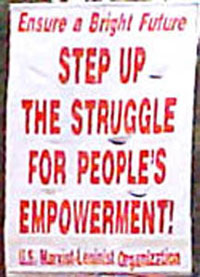 In the race for sheriff, current Sheriff Timothy Howard won a close election against Bernie Tolbert. Turn out was 35%. Tolbert secured 103,382 votes, or 49%, while Howard got 106,771, or 51%. Like many races in this period, a significant portion of Tolbert’s votes were not so much for him as against Howard. Howard is notorious for his brutally and racism, including recently participating, in uniform, at a rally promoting slavery and the confederacy. As well, Tolbert, who is African American, when asked by youth activists how he would deal with issues of racism and police brutality responded that he was a sheriff first. Given this stand, and that he is also a former FBI agent, many felt the racism and brutality at the jail and by the county sheriff’s department would continue.
In the race for sheriff, current Sheriff Timothy Howard won a close election against Bernie Tolbert. Turn out was 35%. Tolbert secured 103,382 votes, or 49%, while Howard got 106,771, or 51%. Like many races in this period, a significant portion of Tolbert’s votes were not so much for him as against Howard. Howard is notorious for his brutally and racism, including recently participating, in uniform, at a rally promoting slavery and the confederacy. As well, Tolbert, who is African American, when asked by youth activists how he would deal with issues of racism and police brutality responded that he was a sheriff first. Given this stand, and that he is also a former FBI agent, many felt the racism and brutality at the jail and by the county sheriff’s department would continue.
Perhaps what stands out most about the election is that the main concerns of the people, such as poverty, inequality and the danger of war and how the city and county can contribute to peace, were absent. This is a reflection of an electoral process that blocks working people from having a say in the agenda and the ability to choose candidates that represent a people’s agenda. Instead people are reduced to being voting cattle and divided along various lines, such as race, religion and gender. Given the education and experience of workers and youth of Buffalo, this is a process that needs to be modernized to put the people in decision making positions at every step in the process. This includes choosing the candidates from among their own ranks and together determining the platform.
[TOP]
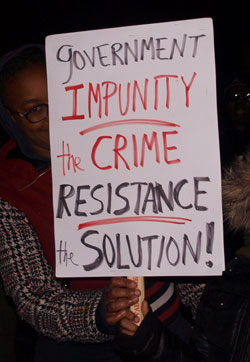 As part of the Scandalous News radio show on WBNY, students are provided with news and information on key issues of the day. In particular, a “scandal of the week” question is posed to generate discussion and thinking about problems. The question commonly addresses an issue that has been widely promoted in the news, and contrasts it with an alternative way of looking at the question.
As part of the Scandalous News radio show on WBNY, students are provided with news and information on key issues of the day. In particular, a “scandal of the week” question is posed to generate discussion and thinking about problems. The question commonly addresses an issue that has been widely promoted in the news, and contrasts it with an alternative way of looking at the question.
Recently, the question concerned issues of government racism and Trump’s comments about Charlottesville, where the KKK and Nazis were opposed by a large demonstration standing against racism and for rights. A pro-Nazis person ran a car into the anti-Nazi, anti-KKK rally, killing one person and injuring many more. Trump commented that both sides were responsible and made various other remarks supporting the pro-Nazi/KKK forces, which were widely promoted.
The “scandal of the week” question asked: Is the real scandal Trump’s comments about Charlottesville OR State Organized Racist Attacks, such as mass incarceration, police killings, raids on immigrants and Muslims, growing inequality — and government refusal to solve these problems?
Here are some of the responses from students, gathered randomly in the library and student union.
“I think the real scandal is about the racist attacks and mass incarceration, not Trump’s comments, because those are just words, not actions. As a president he should be able to make comments about those problems, like mass incarceration, and not about Charlottesville. The real issue is what is he really going to do for us? Police killings and raids on immigrants and Muslims and growing inequality, those are the real issues.”
“I personally feel that Trump’s comments are not the main issue that should be discussed. There are way more important issues to discuss, such as student loans, such as poverty, or the war on drugs. All they really worry about is locking people up, rather than freeing people and helping others. There are a lot of people in Manhattan and Queens that are homeless but that is not told. Trump’s comments, that is just an opinion, it’s not a fact. Issues like loans and poverty and violence are real, those are numbers you can add up.”
“I think what Trump said was wrong. But instead of focusing on what he said, we should focus on people’s lives.”
“I would have to say the real scandal would be Trump’s comments about Charlottesville because with all the hatred and violence and racism that is going on, instead of him really putting that to rest he just said well they are wrong and you guys are wrong also. You can’t say that. You have to say what is wrong and cut it right there and he didn’t. So I would say Donald Trump is the major problem.”
“My view is that it’s more on the police killings and raids on immigrants and Muslims because they all connect back to the president and he is the one that is supposed to be a leader for the country If he is not solving his problems how are we supposed to be leaders for the world and for the kids? We as students can lead by example and tell kids at a younger age that they should be aware of what is going on.”
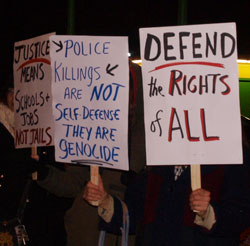 “The bigger scandal is definitely the state organized racist attacks, mass incarceration and police killings. It is something that people don’t really talk about. It kind of goes under the rug, that’s why they keep doing it. We are so focused on what Trump did or didn’t say about a situation that we are ignoring a bigger picture. The Charlottesville thing was horrible but the state organized racist attacks, those are always happening every day, all the time, and his comments were just a one-time incident. As students we can voice together. We’ve seen that peaceful protest kind of works but kind of doesn’t. There is something else we need to do, like show up to town meetings, like get your voice heard.”
“The bigger scandal is definitely the state organized racist attacks, mass incarceration and police killings. It is something that people don’t really talk about. It kind of goes under the rug, that’s why they keep doing it. We are so focused on what Trump did or didn’t say about a situation that we are ignoring a bigger picture. The Charlottesville thing was horrible but the state organized racist attacks, those are always happening every day, all the time, and his comments were just a one-time incident. As students we can voice together. We’ve seen that peaceful protest kind of works but kind of doesn’t. There is something else we need to do, like show up to town meetings, like get your voice heard.”
“I think the more serious problem is the police because they are supposed to protect us. We don’t have the power to stop them that we should have. We shouldn’t have police kill us, especially when we haven’t done anything.”
“I think that the problem is that the government is in control of the people and that the people can’t stop them no matter how hard we try. We have to overthrow the government. It needs to be gone. I don’t understand why it is the way that it is. I think education can be more based on teaching children and future generations on not being ignorant and realizing that love is love and we are all human beings. We are all on this earth and the way that we look doesn’t matter. We are all just here and need to work together so that we can be here longer and take care of our planet. I don’t believe anything the government tells me and never will.”
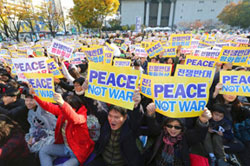 The next “scandal of the week” question is:
The next “scandal of the week” question is:
“There has been a lot of news about nuclear weapons and most of it emphasizes north Korea as the threat. Is the biggest scandal testing by the Koreans, or the fact that the U.S. president, alone, can launch nuclear war?”
Look into the issues, get informed and join the discussion. Buffalo Forum and Voice of Revolution provide information on these matters, so get one from your campus distributor!
[TOP]
